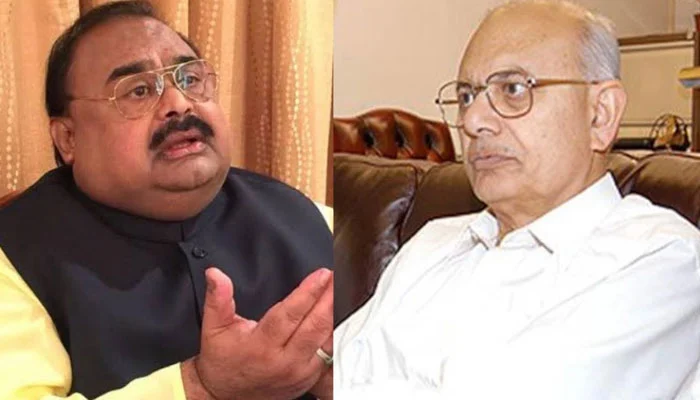LONDON: Altaf Hussain, the founder and leader of the Muttahida Qaumi Movement (MQM), has applied to have Tariq Mir, a former member of the MQM’s Rabita Committee, have his defamation lawsuit against him and seven other MQM activists dismissed by UK High Court judge Justice Chamberlain denied.
The judge decided that the MQM founder could not be kept apart from the case against Altaf and others, which included Ather Aziz, Hashim Aziz, Moeen Ahmed Khan, Nadeem Pervez Sheikh, Nasir Ali, Suhail Ahmed Khanzada, and Yasmeen Novein. The case would go to trial.
Tariq Mir was once an ardent supporter of Altaf until he parted ways with him in 2016. He was a trustee of the Society for the Unwell and Needy (SUN) and the main treasurer of MQM.
He filed a defamation lawsuit against the MQM founder and others after press releases that were posted on the organization’s website on November 17 and 29, 2022, and a protest against him that took place on November 27, 2022, outside a hotel in Wembley that was the site of Tariq Mir’s SUN charity dinner, which was streamed live on the MQM Facebook page.
Although Altaf Hussain was not present at the protest, the MQM workers who assembled and broadcast the event live referred to Mir as a “dishonest person,” “a thief,” “a fraud,” and “a corrupt” individual who had allegedly taken the entire SUN charity from Hussain for his own extravagant lifestyle, showing disdain for the MQM martyrs.
Mir filed a defamation lawsuit, alleging that Altaf was to blame for the disparaging remarks made about him because he approved of their publication on the MQM Facebook page and website and was aware that Hussain was in complete control and that nothing occurred in the MQM without his consent.
Altaf filed an application with the court to have Mir’s case against him dismissed in order to get summary judgment after Mir made his claim. Additionally, he took issue with Mir’s request to revise his assertion in order to make it stronger against Altaf.
The MQM founder said in court that he is a “figurehead” who typically stays out of day-to-day decision-making within the MQM, that he is not tech-savvy, not just not reading the several WhatsApp groups he is added to but also not sending emails or making phone calls. In his witness statement, he claimed that he has no influence over and is not involved in choosing what to publish on his social media platforms. Mustafa Ali of MQM argued in court that Altaf would not know what was on the website, would not be interested in it, and would have faith in its administrators to post pertinent content. The court was further informed by two other witnesses that Altaf was unaware of the person who had posted the defamatory remarks on MQM’s website, which were later taken down, and that Mir’s complaint ought to be dismissed.
Mir testified in court that in his nearly two decades of serving in senior positions within the MQM, he never witnessed anything being posted on the organization’s platforms without Altaf’s consent; the MQM chief also provided members in charge of running the organization’s media platforms with standing orders, which they dutifully obeyed. Mir informed the court that they would face consequences if they disregarded these directives.
The moment Tariq Mir’s attorneys referred the court to Altaf’s testimony in support of his case in the MQM London properties case (Altaf Hussain vs. Aminul Haque/MQM Pakistan) before the London High Court marked a turning point in the proceedings. The testimony of Altaf, Ali, and Qasim Ali in Mir’s defamation case was presented to the court as a contradiction to the testimony of all three of them in the MQM properties case, wherein they informed ICC Judge Jones that Hussain was the one who always approved documents and that Altaf had to be consulted for any decisions pertaining to politics, policies, and the organization.
“Whenever any statement or letter to the public is being prepared, it is submitted to the CCC who read it and give suggestions to the First Defendant,” Ali had stated to the court in that particular case. The First Defendant authorizes the documents and adds any recommendations he thinks fit.
The MQM website included photos of the company’s founder overlayed with hearts and rose petals, which Mir’s attorneys claimed was primarily a personal platform and respect to Altaf.
The judge decided that since Altaf had not proven Mir had any realistic chance of winning, the matter would have to go to trial in order to resolve the difficulties.
In addition, the judge decided to grant Mir’s request to alter the case, meaning that Altaf and the other seven defendants will now face trial.
“This judgement is very basic,” a source close to MQM in London stated. We are well prepared for the trial, which will determine the true issues. There was nothing derogatory said about Altaf Hussain. The true problem still stands in how the martyrs’ properties were appropriated and how so many former allies betrayed the founder’s confidence.
Sadia Qureshi and Ushrat Sultana of Stone White Solicitors and Counsel Claire Overman of Doughty Street Chambers represented Mir. Attorney Gervase de Wilde of 5RB Chambers and a solicitor represented Altaf.







